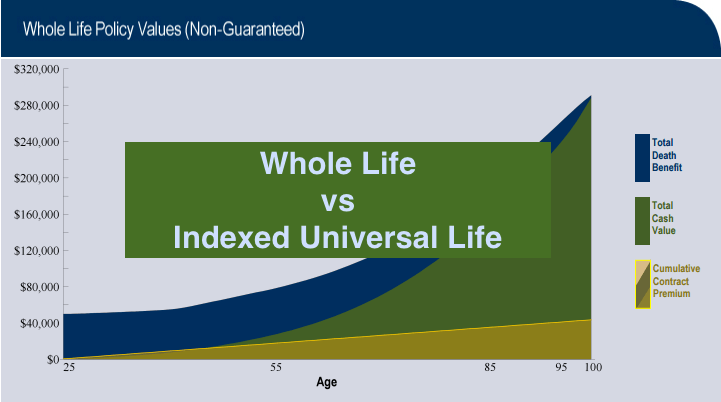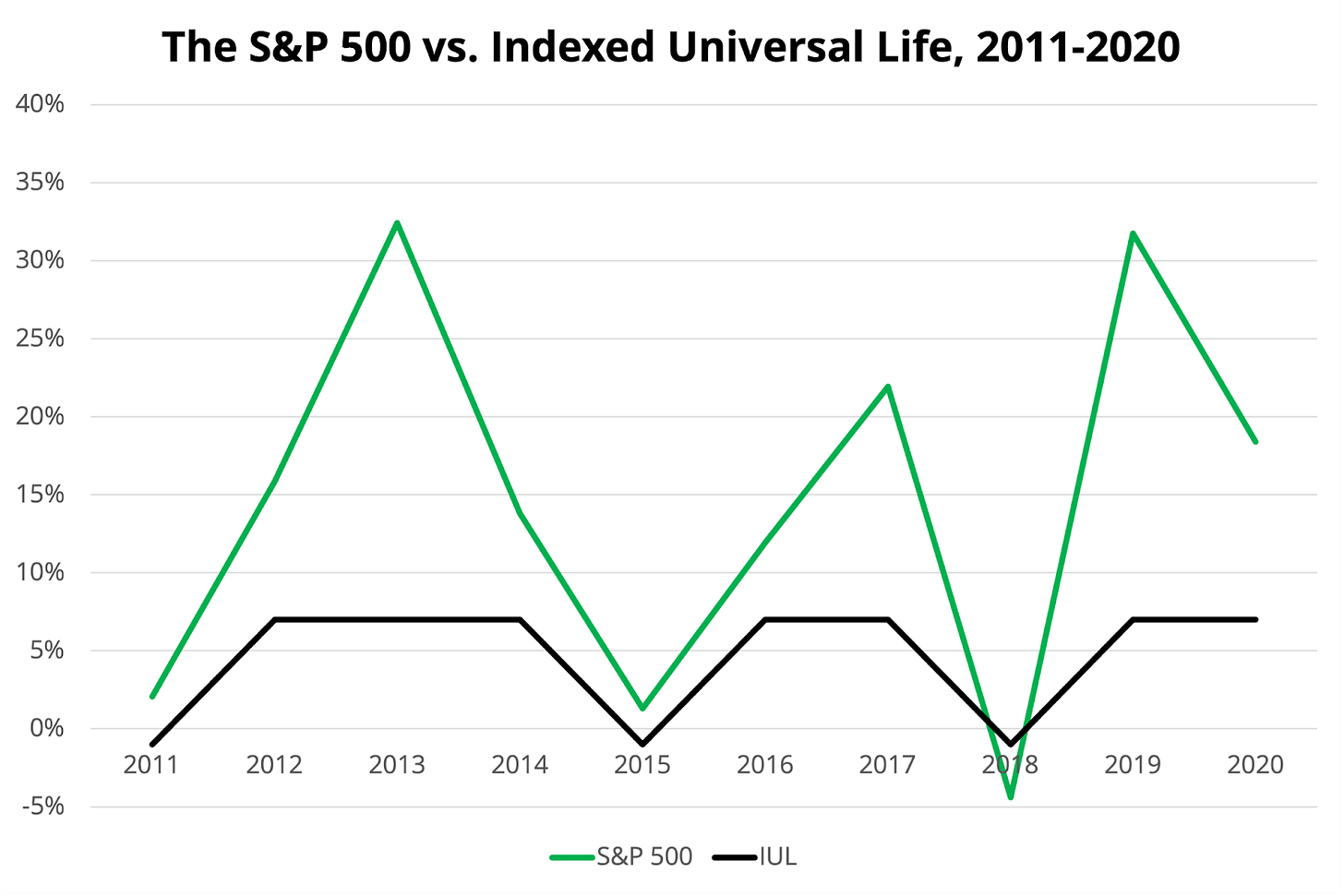All Categories
Featured
Table of Contents
1), usually in an attempt to defeat their classification standards. This is a straw guy disagreement, and one IUL people love to make. Do they compare the IUL to something like the Vanguard Overall Stock Exchange Fund Admiral Shares with no tons, an expenditure ratio (ER) of 5 basis points, a turnover proportion of 4.3%, and an outstanding tax-efficient document of distributions? No, they compare it to some awful proactively handled fund with an 8% tons, a 2% ER, an 80% turn over proportion, and an awful record of short-term funding gain circulations.
Mutual funds frequently make annual taxable distributions to fund owners, also when the worth of their fund has actually gone down in value. Mutual funds not just call for earnings reporting (and the resulting annual taxation) when the common fund is rising in worth, but can also enforce income tax obligations in a year when the fund has actually dropped in value.
You can tax-manage the fund, collecting losses and gains in order to reduce taxed distributions to the investors, however that isn't somehow going to transform the reported return of the fund. The possession of common funds may need the mutual fund owner to pay projected taxes (best indexed universal life insurance companies).

IULs are very easy to position to ensure that, at the owner's death, the beneficiary is not subject to either revenue or inheritance tax. The same tax reduction methods do not function virtually too with mutual funds. There are numerous, often pricey, tax obligation catches connected with the moment trading of shared fund shares, traps that do not relate to indexed life Insurance coverage.
Opportunities aren't very high that you're mosting likely to be subject to the AMT due to your mutual fund distributions if you aren't without them. The remainder of this one is half-truths at best. While it is real that there is no earnings tax obligation due to your heirs when they acquire the profits of your IUL plan, it is also true that there is no income tax due to your beneficiaries when they acquire a mutual fund in a taxed account from you.
Index Universal Life Insurance Tax Free
There are much better ways to avoid estate tax obligation concerns than buying investments with reduced returns. Mutual funds might trigger earnings taxes of Social Safety and security benefits.

The growth within the IUL is tax-deferred and might be taken as tax obligation totally free revenue via loans. The plan owner (vs. the shared fund supervisor) is in control of his or her reportable revenue, therefore enabling them to lower and even remove the tax of their Social Protection benefits. This is fantastic.
Below's another minimal concern. It holds true if you get a mutual fund for claim $10 per share prior to the circulation date, and it distributes a $0.50 distribution, you are after that mosting likely to owe tax obligations (possibly 7-10 cents per share) in spite of the fact that you have not yet had any gains.
In the end, it's really concerning the after-tax return, not just how much you pay in tax obligations. You are going to pay even more in tax obligations by making use of a taxable account than if you purchase life insurance. You're additionally possibly going to have even more money after paying those tax obligations. The record-keeping demands for possessing mutual funds are considerably a lot more intricate.
With an IUL, one's records are maintained by the insurer, duplicates of yearly statements are sent by mail to the proprietor, and circulations (if any) are amounted to and reported at year end. This one is also kind of silly. Naturally you should maintain your tax documents in instance of an audit.
Iul Retirement Calculator
Rarely a factor to buy life insurance policy. Mutual funds are typically component of a decedent's probated estate.
On top of that, they go through the hold-ups and expenses of probate. The profits of the IUL policy, on the various other hand, is always a non-probate circulation that passes beyond probate directly to one's called recipients, and is therefore not subject to one's posthumous lenders, undesirable public disclosure, or similar hold-ups and costs.
Medicaid incompetency and life time earnings. An IUL can offer their proprietors with a stream of revenue for their whole lifetime, no matter of just how lengthy they live.

This is valuable when arranging one's events, and converting properties to earnings prior to a retirement home arrest. Shared funds can not be transformed in a comparable manner, and are usually thought about countable Medicaid possessions. This is an additional dumb one supporting that bad individuals (you recognize, the ones who need Medicaid, a government program for the bad, to spend for their assisted living home) must make use of IUL instead of shared funds.
Index Assurance
And life insurance policy looks terrible when contrasted relatively versus a pension. Second, people who have cash to get IUL over and beyond their retirement accounts are mosting likely to have to be dreadful at taking care of money in order to ever qualify for Medicaid to spend for their retirement home expenses.
Persistent and terminal ailment cyclist. All policies will allow a proprietor's very easy access to cash money from their plan, frequently waiving any kind of abandonment penalties when such individuals suffer a serious ailment, need at-home treatment, or come to be constrained to a nursing home. Shared funds do not offer a comparable waiver when contingent deferred sales costs still apply to a common fund account whose owner requires to market some shares to money the expenses of such a keep.
Iul For Retirement Income
Yet you get to pay even more for that benefit (motorcyclist) with an insurance coverage. What a lot! Indexed global life insurance coverage provides fatality benefits to the beneficiaries of the IUL owners, and neither the proprietor nor the beneficiary can ever shed money due to a down market. Shared funds give no such warranties or fatality benefits of any type of kind.
I definitely do not require one after I get to economic self-reliance. Do I desire one? On standard, a purchaser of life insurance pays for the real expense of the life insurance advantage, plus the costs of the policy, plus the earnings of the insurance company.
Benefits Of Iul Insurance
I'm not entirely certain why Mr. Morais included the entire "you can not shed cash" once more below as it was covered rather well in # 1. He just wished to repeat the most effective marketing factor for these things I mean. Once more, you do not lose small dollars, however you can shed real dollars, in addition to face serious possibility price because of reduced returns.

An indexed universal life insurance policy owner might exchange their plan for an entirely different policy without triggering revenue taxes. A mutual fund proprietor can stagnate funds from one shared fund firm to one more without offering his shares at the previous (therefore activating a taxable occasion), and buying brand-new shares at the latter, frequently based on sales charges at both.
While it holds true that you can trade one insurance plan for another, the reason that people do this is that the very first one is such a terrible plan that even after purchasing a brand-new one and undergoing the early, unfavorable return years, you'll still come out in advance. If they were marketed the right policy the very first time, they shouldn't have any desire to ever before exchange it and go with the early, adverse return years once more.
Latest Posts
Best Iul Life Insurance Companies
Iul Illustration
Equity Indexed Whole Life Policy